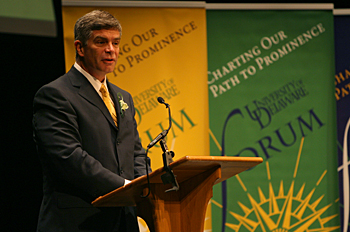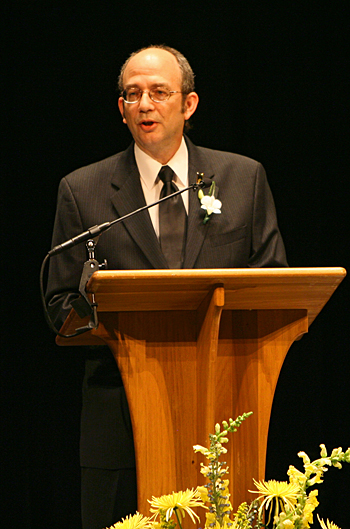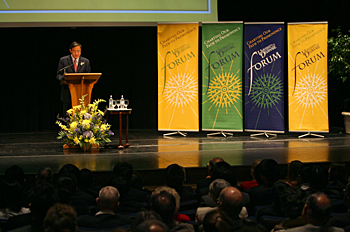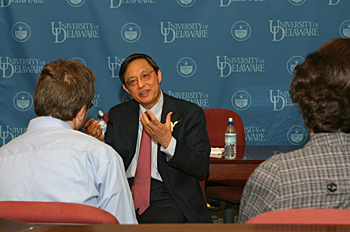Click here for a video podcast of this program.
Click here for an audio podcast of this program.
6:30 p.m., May 11, 2008--Calling globalization “an irreversible historical trend,” China's ambassador to the United States told an overflow audience at the University of Delaware that continuing a spirit of constructive cooperation will benefit not only the two nations but also the entire world.
Zhou Wenzhong, whose full title is ambassador extraordinary and plenipotentiary of the People's Republic of China to the United States, delivered the opening keynote address at the inaugural UD Forum, held Saturday, May 10, on campus. Zhou, who was named to his current position in 2005, spoke of the increasingly interdependent nature of the relationship between what he described as the world's major developed nation and the world's major developing nation.
With the two nations having such different histories and cultures, he said, “It is only natural that we may sometimes see things differently.” But, he noted, “Our economies have so much to offer each other. There is every reason for us to join hands.”
The ambassador was introduced to the audience in Mitchell Hall by University President Patrick Harker, who pointed out the ties between UD and China, including more than 330 Chinese undergraduate and graduate students currently enrolled. In addition, the University has formal exchange agreements with Beijing Normal University, Southwestern University of Finance and Economics, Hong Kong Polytechnic University, Xiamen University and Nanjing University.
Harker also spoke of UD's growing East Asian Studies Program, its nearly 300 students now enrolled in Chinese language courses and many Chinese faculty members, including internationally acclaimed violinist and Associate Professor of Music Xiang Gao. In the past two years, about 150 UD students have traveled to China as part of study-abroad programs, Harker said.

Globalization is “one of the prominent features of the world today,” Zhou said, and although there might be disagreement about when the trend began, there is no doubt it is here to stay and is destined only to increase as a result of technological advances and market forces. He cited numerous statistics, including the fact that international trade has increased fourfold in the last two decades, more than double the pace of worldwide economic growth.
Backlashes against globalization sometimes occur, and Zhou said that China takes problems sometimes raised by the U.S. very seriously. He urged America to avoid protectionist trade measures, for example, that could slow the progress of internationalization and to instead continue a dialogue with China to address concerns through bilateral agreements.
“It is wrong to blame globalization for domestic problems or to find scapegoats in other countries,” he said. “The economies of our two countries and the world's economy are in the same boat.”
Bilateral discussions and cooperative agreements also are the best means to addressing challenges that affect the U.S., China and the rest of the world, Zhou said. He added that the two nations should continue working together on such shared concerns as terrorism, cross-border crime, energy security, environmental degradation and arms proliferation, as well as on measures to assist such troubled areas as Myanmar, Darfur and Pakistan.
China is marking 30 years since it began its own economic reforms and the process of implementing full diplomatic ties with the United States, Zhou said. In the intervening years, the country has emerged as an economic powerhouse and what the ambassador called “an engine for Asian-Pacific economic growth.”

Zhou also encouraged continuing and expanding educational partnerships and exchanges between China and the United States. In the past 30 years, he said, 400,000 Chinese students, researchers and visiting scholars have studied in the U.S., with about 90,000 currently here, and more than 10,000 American students have studied in China.
In a press conference after his address, Zhou said U.S. interest in learning about all aspects of China is on the increase, assisted by such programs as Confucius Institutes at more than 40 locations in the United States. The institutes are a network of educational centers supported by grants from the Chinese government to teach elementary, high school and college students about Chinese culture and language.
Before Zhou's speech, Alan Fox, associate professor of philosophy and president of the University's Faculty Senate, welcomed the audience to the daylong UD Forum. Fox, whose specialty is Chinese thought, called the ambassador's presence “a perfect example” of the kinds of global partnerships the University is promoting. He also praised the work of the committee and community members who helped with the University's recent strategic planning process.
“We are so much a better University than we were 20 years ago” when he joined the faculty, Fox said. In building on that progress to advance still further, he urged UD to remember its commitment “to excellence, to open-minded discourse and, most importantly, to our students.”
Zhou joined the Beijing Diplomats Service Bureau in 1970, where he worked until 1973, when he went to the United Kingdom for advanced studies at the University of Bath and the London School of Economics. He has been employed in the Foreign Ministry's Translation Office and has served as ambassador extraordinary and plenipotentiary to Barbados and concurrently to Antigua & Barbuda and later to Australia.
He has been vice director of the Foreign Ministry's Department of North American and Oceanian Affairs and served as consul general in Los Angeles and, from 1995-98, as China's envoy to the United States. Zhou served as assistant minister of foreign affairs from 2001-03 and as vice minister of foreign affairs from 2003 until accepting the U.S. ambassadorship in 2005.Article by Ann Manser
Photos by Kathy Atkinson




